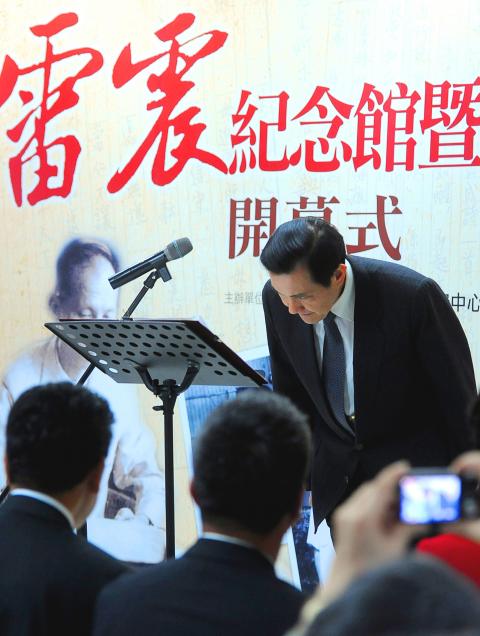President Ma Ying-jeou (馬英九) yesterday apologized for the bad treatment of democracy pioneers by the previous Chinese Nationalist Party (KMT) regime and promised to continue efforts to unveil the truth behind past tragedies.
Ma was addressing the inauguration of a memorial center paying tribute to activist Lei Chen (雷震), who was accused of sedition and sentenced to 10 years in prison for publishing a magazine trumpeting democracy in 1960.
The memorial hall and research center were established to honor him on the 33rd anniversary of his death.

Photo: Wang Min-wei, Taipei Times
Ma said the establishment of the center at National Chengchi University was of great significance, because the university used to be a school for the KMT.
“[The KMT] owes Lei Chen an apology and as president and KMT chairman, I offer my apology to let people know that the government is willing to face history and correct past mistakes with honesty,” Ma said.
The president stressed the government’s efforts to compensate victims of the 228 Massacre and White Terror era as it uncovers the truth, and promised to carry out measures related to transitional justice.
“The nation paid a price during the 228 Massacre and White Terror era and the protection of human rights will be a major topic for the nation’s future development,” he said.
Lei, a KMT member, had been charged by the KMT authorities with sedition for publishing the opposition Free China (自由中國) magazine and launching the China Democratic Party.
He passed away in 1979 at the age of 81.
In 1998, then-Taipei mayor Chen Shui-bian (陳水扁) began seeking national compensation for Lei on his behalf and honored him as a pioneer of democracy after the DPP came into office in 2000.
Former premier Yu Shyi-kun and Lei’s daughter, Lei Mei-lin (雷美琳), also attended the ceremony yesterday.
Lei Mei-lin said the family had chosen to forgive the KMT in the name of social harmony.

Alain Robert, known as the "French Spider-Man," praised Alex Honnold as exceptionally well-prepared after the US climber completed a free solo ascent of Taipei 101 yesterday. Robert said Honnold's ascent of the 508m-tall skyscraper in just more than one-and-a-half hours without using safety ropes or equipment was a remarkable achievement. "This is my life," he said in an interview conducted in French, adding that he liked the feeling of being "on the edge of danger." The 63-year-old Frenchman climbed Taipei 101 using ropes in December 2004, taking about four hours to reach the top. On a one-to-10 scale of difficulty, Robert said Taipei 101

A preclearance service to facilitate entry for people traveling to select airports in Japan would be available from Thursday next week to Feb. 25 at Taiwan Taoyuan International Airport, Taoyuan International Airport Corp (TIAC) said on Tuesday. The service was first made available to Taiwanese travelers throughout the winter vacation of 2024 and during the Lunar New Year holiday. In addition to flights to the Japanese cities of Hakodate, Asahikawa, Akita, Sendai, Niigata, Okayama, Takamatsu, Kumamoto and Kagoshima, the service would be available to travelers to Kobe and Oita. The service can be accessed by passengers of 15 flight routes operated by

Taiwanese and US defense groups are collaborating to introduce deployable, semi-autonomous manufacturing systems for drones and components in a boost to the nation’s supply chain resilience. Taiwan’s G-Tech Optroelectronics Corp subsidiary GTOC and the US’ Aerkomm Inc on Friday announced an agreement with fellow US-based Firestorm Lab to adopt the latter’s xCell, a technology featuring 3D printers fitted in 6.1m container units. The systems enable aerial platforms and parts to be produced in high volumes from dispersed nodes capable of rapid redeployment, to minimize the risk of enemy strikes and to meet field requirements, they said. Firestorm chief technology officer Ian Muceus said

MORE FALL: An investigation into one of Xi’s key cronies, part of a broader ‘anti-corruption’ drive, indicates that he might have a deep distrust in the military, an expert said China’s latest military purge underscores systemic risks in its shift from collective leadership to sole rule under Chinese President Xi Jinping (習近平), and could disrupt its chain of command and military capabilities, a national security official said yesterday. If decisionmaking within the Chinese Communist Party has become “irrational” under one-man rule, the Taiwan Strait and the regional situation must be approached with extreme caution, given unforeseen risks, they added. The anonymous official made the remarks as China’s Central Military Commission Vice Chairman Zhang Youxia (張又俠) and Joint Staff Department Chief of Staff Liu Zhenli (劉振立) were reportedly being investigated for suspected “serious